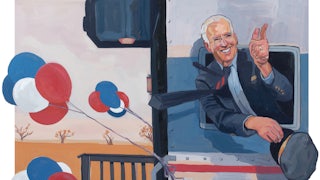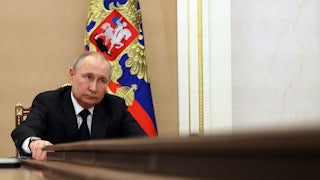The headline in The Atlantic captures the moment: “It’s a Great Time to Hoard Nickels.” Over the last few years, global industry has been facing a nickel shortage because the metal is in hot demand as a key component in electric-car batteries. Since Russia provides about 20 percent of the world’s supply of high-grade nickel, Vladimir Putin’s brutal invasion of Ukraine has now triggered a global supply crisis. Earlier this month, nickel prices soared 90 percent on the London Metal Exchange. As a result of this price volatility, the world’s biggest nickel producer (the Chinese company Tsingshan Holding Group) potentially lost billions by trying to short the market.
Oddly enough, I am a bit of an expert on worldwide nickel shortages. In 1935, commercial representatives of Nazi Germany and Mussolini’s Italy were prowling New York and Toronto desperate to get a line on impossible-to-obtain Canadian nickel. At the time, Canada provided about 90 percent of the world’s supply—and the Canadians were deeply aware that the metal was a war material needed to line the inside of guns. The Toronto Globe and Mail said in a blunt 1935 editorial referring to World War I, “Canada remembers with a bitterness still unhealed that Canadian soldiers were killed in France by German shells and bullets hardened with Canadian nickel.”
Enter an unlikely savior for the Nazis and the Italian fascists—my con-man great-uncle Freeman Bernstein. Born in 1873 in Troy, New York, Freeman was a vaudeville agent, boxing manager, card sharp, horse-race fixer (he was banned from tracks on three continents), and jewel smuggler who, late in life, had crowned himself the “Jade King of China.” But by 1935, the man whom Variety had dubbed “the Pet of Broadway” was down on his luck buffeted by both the Depression and the disappearance of the Broadway world of the vaudeville era.
As I recount in my 2016 biography of Freeman, Hustling Hitler, my great-uncle remained resourceful, even though his suits were threadbare and his rent unpaid. Along with Meyer Brenner, a corrupt metals dealer in Toronto, Freeman concocted an elaborate swindle to give the Nazis what they wanted—more than 200 tons of supposedly Canadian nickel.
There were three key ingredients to the sting: 20 pounds (not tons) of high-grade nickel that Freeman purchased from a mineral shop in lower Manhattan; seven freight cars of scrap metal (mostly tin cans, rusted brake drums, and the carcasses of Model T Fords) bought in Toronto; plus, of course, the cupidity of the buyers. A few whispers in the right places touched off a bidding war for the Canadian nickel, with Otto Kafka (Franz’s American cousin) among those working on behalf of Germany.
Once a deal had been arranged in Toronto at a slightly inflated price, Freeman and his business associates (all of them Jewish) demanded a few unusual conditions. The Hamburg-bound cargo had to be labeled “scrap metal” ostensibly to bamboozle Canadian customs. An obscure testing lab was hired to assay the metal because using the leading firm in the field would supposedly alert the Canadian nickel cartel. For secrecy, the cargo inspection took place at odd hours and under peculiar conditions, aided by a $5,000 bribe to the man who was certifying the cargo. It also didn’t hurt that the metal was shipped by the freighter Liberty out of Halifax, Nova Scotia, in early March 1936 with the subfreezing weather limiting anyone’s last-minute curiosity about the transaction.
Freeman learned an important lesson during his years in show business—when to get off the stage. With the bogus nickel sailing across the Atlantic and the modern equivalent of $2 million in his bank account (soon to be looted by his confederates), Freeman headed to Asia. While he was buying and selling jewels and fakes, the angry middlemen representing Germany in the nickel deal obtained a New York City indictment charging my great-uncle with grand larceny for defrauding the Nazis.
A year later, living well in Los Angeles, Freeman was arrested on a fugitive warrant while reclining in the back of his chauffeured limousine just after he left Mae West’s apartment at midnight. After a night in lockup, Freeman met the press, delivering lines like this in a foghorn voice: “Hitler ain’t got a thing on me.” The L.A. papers knew how to play this morality tale. The front page of the Herald and Express featured a picture of Freeman on the left (“Adolf Hitler Got Just Exactly What He Paid For!”) and a frowning photo of the Nazi leader on the right (“Fuhrer Adolf Hitler ‘Hooked’ in Buying Nickel From Mr. Bernstein, Claim”). This kind of publicity and the support of leading Jewish figures in Hollywood like singer Al Jolson convinced Republican California Governor Frank Merriam to refuse to extradite Freeman to New York for the Hitler hustle.
I have often wondered how much Freeman was motivated by anti-Nazi zeal in his determination to fool the Führer. During an early planning meeting with Brenner, his shady partner, Freeman said, “They are going to kill all the Jews there in Germany and you had better send them plenty of pig iron and mess it up with tin cans and have them packed and pressed.” But, at other times, Freeman and Brenner seemed equally eager to defraud the Dutch or other Europeans outside Germany’s 1936 sphere. That, more often than not, is the human response to impending global tragedy—idealism mixed with a hefty dose of self-interest.
As Russia’s war in Ukraine enters its second month and the economic sanctions on Moscow pinch tighter, there will always be unscrupulous hustlers and businessmen operating at the margins. My hope is that for every scam artist working behind the scenes in Europe on behalf of Putin’s pet oligarchs, there will be another one like my great-uncle Freeman, sensitive to the plight of the Ukrainian people and pantingly eager to rip off the Russians.


